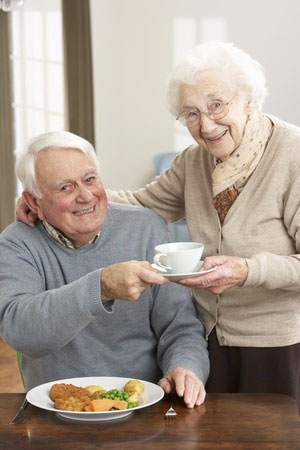 Are you getting enough protein? Plenty of seniors aren’t.
Are you getting enough protein? Plenty of seniors aren’t.
NIH studies have indicated that malnutrition— especially protein deficiency— is under-diagnosed in older adults, and that can bode poorly for seniors who are admitted to the hospital. Chronic undernourishment means a longer road to recovery or even poor health outcomes for acute injuries or serious diseases.
It makes sense, if you think about it. As we age, our metabolism naturally slows down and our bodies become less efficient at gathering nutrients from our food, or at putting those nutrients to good use. A reasonably healthy 80-year-old is probably not realizing the same nutritional benefit as a 60-year-old would when they are given the same meal.
This is especially true of our ability to take in and store proteins— the building blocks of our bodies' tissues, hemoglobin (the iron-based substance that binds oxygen in the blood so that oxygen can be distributed to our tissues) and our enzymes. Not only are older people less able to extract usable proteins from food, they break down stored proteins in the body at a faster rate.
A Vicious Cycle
The process by which proteins are broken down, called catabolism, is accelerated in older people precisely because their bodies are less efficient at using the nutrients present in food. Seniors' bodies attempt to make up their nutritional intake deficiencies by breaking down skeletal and muscle mass into usable proteins. This leads to sarcopenia— also known as "frailty."
As a person becomes increasingly frail due to accelerating catabolism, their ability to absorb proteins from food is further reduced, which leads to more sarcopenia. It's a nasty downward spiral that, once it gets going, is very hard to slow down.
Worse yet, general frailty has been clinically linked with decreased quality of life, in the form of undesired weight loss, reduced range of motion and loss of strength. Moreover, it is positively linked with catastrophic injuries resulting from falls — including spinal fractures, broken hips, broken ribs, pneumothoraces (air pockets behind the chest wall caused by damaged lungs) and intracranial hemorrhages (bleeding in the brain) — all of which are common causes of decline and death in the elderly.
So how much protein should you be getting?
It depends on your age, your current weight, your general state of health and your activity level. The easy answer would be to refer you to a dietician or senior nutrition specialist, who could assess your needs and help you to develop a plan. But here are some broad guidelines:
- Adults aged 55 or younger who are reasonably active, but not actively undergoing strenuous physical training, should eat 0.8 grams of protein per kilogram of body weight per day. Given that 1 lb = 0.4536 kg, a 180-lb person should take in an average of about 65 grams of dietary protein a day.
- Adults over the age of 55 with normal activity levels should take in 1 gram of protein per kilogram of body weight per day. So a 180-lb person should eat about 82 grams of protein per day.
- Adults over the age of 55 who are injured or are facing illness should up their intake to 1.3-1.6 grams of protein per kilogram per day, depending on the seriousness of their conditions.
How can I increase my protein intake?
Eating a little more lean meat every week, like chicken, fish, pork tenderloin, or turkey, is traditionally the frontline option. An average-sized skinless chicken breast has about 30 grams of protein, for example— about a third of the recommended daily amount for healthy seniors.
You'll want to go sparingly on the red meats, though, as they are high in cholesterol. Same goes for processed meats, like bacon, sausage and cold cuts, which are loaded with cholesterol and all high in nitrites— suspected by many scientists to be carcinogenic (cancer-causing).
Eggs are a wonderful protein source, but again, eat in moderation as yolks are also high in cholesterol. Instead, use just the egg whites to make your morning omelet.
Low-fat dairy products (like 1% milk fat yogurt), nuts, seeds and beans are excellent sources of protein. Soy products like tofu, soy milk, edamame (steamed soybeans) and tempeh (fermented soy patties) will help to keep you on track, too.
Don't go it alone. Seek expert dietary advice.
As with any lifestyle or dietary change, rushing in headlong isn't the smartest, or safest, thing to do.
Talk with your doctor or a registered dietician to determine the most balanced course of action. Exercise as regularly as possible, allow time to get plenty of sleep and do your best to eat smart. With the right nutrition plan, you'll be living well for a long time to come.












